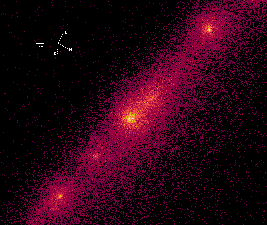

NOTE: Click on the image to view it at its highest resolution.
This is an enlargement of a NASA Hubble Space Telescope image of the "brightest nucleus" in a string of approximately 20 objects that comprise comet P/Shoemaker-Levy 9. The comet is hurtling toward a July 1994 collision with the giant planet Jupiter.
Hubble's high resolution shows that this bright region is actually a group of at least four separate pieces. The HST images allow for the best separation of the individual nuclei and their surrounding halo of dust (comae), which results in a better estimate of the nuclear sizes.
The image was taken with the Wide Field and Planetary Camera (WFPC), in PC mode, on July 1, 1993. The Hubble observations show that the cometary nuclei are probably less than three miles (5 km) across, as opposed to earlier estimates of nine miles (14 km).
The new Hubble data show that the impacts will unleash only 1/10th to 1/100th as much energy as thought previously. However, even with these new size estimates, the total energy of the July 1994 collisions will be equivalent to 100 million megatons of TNT.
credit: Dr. H. A. Weaver and Mr. T. E. Smith, STScI
NASA
Photo Caption STScI-PR93-22c
![]() Images, Images, Images
Images, Images, Images
